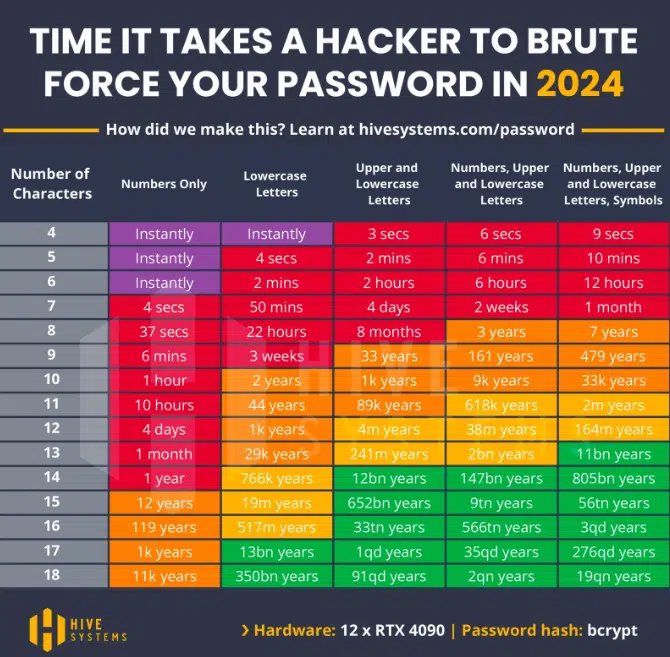As we venture deeper into 2024, the battle between cybersecurity measures and hacking attempts grows increasingly complex. Despite advances in technology, vulnerabilities still exist and can expose personal and professional data to significant risks.
In the dynamic world of cyber threats, understanding the time it takes for hackers to crack passwords and the effective strategies to counteract these efforts is more crucial than ever.
The Accelerating Pace of Hacking
A decade ago, a password combining letters, numbers, and symbols could deter hackers for years, but today, the same password might succumb to hacking tools within weeks.
This alarming acceleration is partly due to more sophisticated hacking tools and the exponential increase in processing power available to cyber criminals.
For instance, what once took 106 years to decrypt now may take only three weeks, underscoring the urgent need for stronger cybersecurity protocols.
Understanding Password Vulnerability
The length and complexity of a password significantly influence how quickly it can be cracked. Hive Systems’ recent study highlighted this, noting that a simple eight-character password might be deciphered in under a minute.
Conversely, extending a password to 16 characters, even with basic composition, could safeguard your data for over a century, making it a formidable barrier against brute force attacks.
The Impact of Poor Password Practices
The theft of passwords can lead to severe privacy breaches—exposing sensitive personal data such as bank information, addresses, and private communications.
These incidents can extend beyond individual harm, affecting vast networks of contacts and leading to widespread vulnerabilities.
Furthermore, compromised passwords can facilitate phishing attacks, where victims are manipulated into revealing additional information or making financial transactions.
Strategic Password Creation in 2024
To fortify your digital defenses, consider the following guidelines for password creation:
- Opt for Length and Complexity: Choose passwords with a minimum of 12 characters, incorporating a mix of uppercase letters, lowercase letters, numbers, and symbols.
- Avoid Personal Information: Clear, easily guessable passwords that include your name, birth date, or simple sequences.
- Use Unique Passwords for Different Accounts: Diversify your passwords to prevent a single breach from compromising multiple accounts.
- Consider a Password Manager: Tools like password managers can help you maintain a roster of complex passwords without memorizing each one.
- Enable Two-Factor Authentication: Where possible, activate two-factor authentication for an added layer of security.
Modern Solutions: Beyond Traditional Passwords
As password-cracking techniques become more advanced, the security community is exploring alternative authentication methods. Innovations like biometrics, behavioral analytics, and single sign-on (SSO) technologies are gaining traction.
Additionally, the concept of ‘passkeys’, which rely on cryptographic techniques rather than memorizable passwords, is being rolled out by major tech companies like Google.
Final thoughts
The stark reality of 2024 is that password security is no longer a passive aspect of digital hygiene but a critical component of personal and organizational security strategies. As hacking methods evolve, so too must our approaches to securing digital identities.
By adopting robust password practices and staying informed about emerging security technologies, individuals and businesses can significantly mitigate the risk of cyberattacks.
The journey towards comprehensive cybersecurity is ongoing, and staying ahead requires vigilance, adaptation, and proactive measures.






































